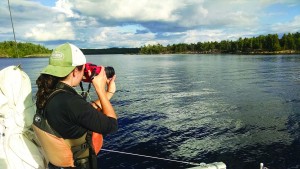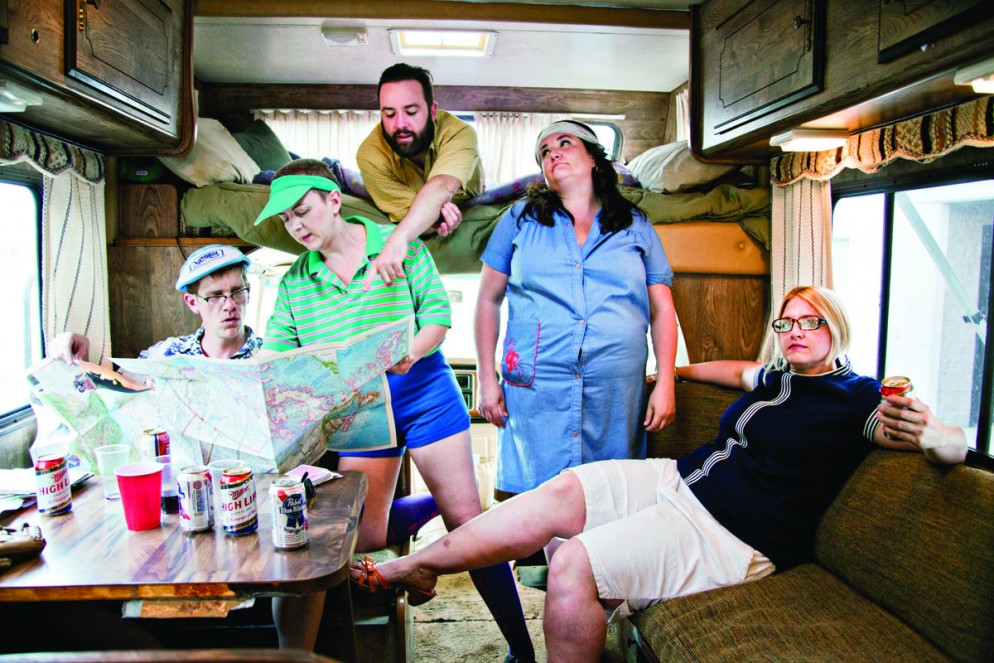This summer, CC alumni will return to campus to teach Colorado College’s Summer Institutes — courses in which students can choose to visually communicate climate change, or create their own play.
Summer Institutes are a cornerstone of CC’s strategic plan, “Building on the Block.” These intensive, extended-format courses encourage experimentation, development of new skills, deep engagement, and interdisciplinarity. Students will hone the traditional liberal arts skills of writing, critical analysis, and research and discover how to translate them into post-graduation and career assets.
Having alumni return to CC to teach the institutes is a deliberate choice that comes with many benefits, according to Emily Chan, associate dean of academic programs and strategic initiatives.
“It makes sense to engage alumni expertise,” says Chan. “Students are mentored by people who are not only experts in their fields, but who also understand the strength and culture of learning on the Block Plan.”
“Alumni are well suited to help students leverage the skills developed in the intensive Block Plan environment and put them in action in a setting a little different from the usual block class, which is generally one project, one topic at a time. In the institutes, they learn to manage complex, multi-dimensional educational projects,” Chan says.
Like all CC Summer Session courses, Summer Institutes are open to both CC and non-CC students. (Summer Institutes are extended, thematic courses, while Summer Session courses are regular block courses.) And currently enrolled CC students can use their “Wild Card” for one block of free tuition during a Summer Institute.
Collaboration and Creation: The Summer Theatre Institute
“If you’d like to make a show this summer with Buntport Theater Company, we’d love to have you!”
That’s the friendly invitation extended by Brian Colonna ’00, ensemble member with Denver’s Buntport Theater, in a quirky promotional video (complete with a pooping dragon and Comic Sans, the oft-ridiculed font) on the CC Summer Session website.
Buntport Theater Company is a vibrant ensemble of five full-time collaborators who write, perform, and give technical support to all of their own work. The company, which is celebrating its 15th season, includes Colonna, Erin Rollman ’98, Hannah Duggan ’98, Erik Edborg ’97, and Samantha Schmitz ’00.
The Summer Theatre Institute, whose official course name is TH 234 Collaboration and Creation: Devising New Work with Buntport Theater Company, offers students a unique view into the world of creating original theatre. Nine students will have the opportunity to collaboratively develop a new production from inception to performance.
The production will be a site-specific, outdoor performance at a venue in downtown Colorado Springs, which includes decommissioned railroad tracks, an old railroad depot, three train cars, an original dock, and open field space. This unique venue will provide interesting challenges for the artists, and an exciting, immersive experience for the audience, according to ensemble member Rollman. Rollman says the Buntport group has taught three courses during the academic year in years past for the Theatre and Dance Department, and that they were pleased when they were invited to submit their ideas for a Summer Institute course.
“Back when we were attending CC, there was a fair amount of theatre available in the summer, and so we were excited to be a part of a potential return to that,” says Rollman.
“It will be creative madness!” says Rollman, who exudes enthusiasm about the two-block course. “We want adventurers, people full of ideas, who want to play and learn and challenge each other. Then we’ll all spend a crazy amount of time with each other making something we will all be proud to share.”
And Rollman says the venture will be not only creative and fun, but also valuable for developing skills students can translate to their lives and careers later.
“The students will gain experience in brainstorming, writing, editing, designing, building, memorizing, rehearsing, promoting, performing, directing, and budgeting the entire venture. There is nothing more valuable than doing. This course is full of problem-solving, and is entirely hands-on. It will be rigorous and fun.
A Climate Odyssey: The Institute for Visual Environmental Communication
 The course, EV 120: Topics in Environmental Studies, merges art, geographic information systems (GIS), and climate science in the setting of the Colorado Rockies. Students will learn theory and best practices for communicating environmental issues through visual media.
The course, EV 120: Topics in Environmental Studies, merges art, geographic information systems (GIS), and climate science in the setting of the Colorado Rockies. Students will learn theory and best practices for communicating environmental issues through visual media.
This topic is one that the husband and wife team of Zion Klos ’11 and Lucy Holtsnider ’13 are uniquely suited to teach.
Klos is a Ph.D. candidate in environmental sciences at the University of Idaho, specializing in hydrology and climate change communication. Holtsnider is an environmental artist working in book arts, printmaking, photography, and sculpture to comment on areas of overlap between human and manmade environments.
The course will result in some very specialized skills for students interested in pursuing natural or social sciences or the arts, and those interested in environmental or regional studies. At the conclusion of the course, students will be certified by ESRI (Environmental Systems Research Institute) on Level One GIS certification. Beth Scaffidi, director of the GIS lab at CC, will teach the course with Klos and Holtsnider.
For those unfamiliar with the concept of visual environmental communications, Klos explains it this way:
“How many people, when they pick up National Geographic, flip through it and only look at the pictures and the maps without reading the text? That’s because the photos and maps are so cool and really tell a story,” Klos says. “That’s what we’re doing — creating really strong visuals that communicate complex information and can help to influence people’s opinions.”
The institute focuses on climate change and its impact locally in the Colorado Rockies. Through on-campus learning and extended field excursions to the Rocky Mountain Land Library in South Park, Colorado, and to Mesa Verde National Park, students will create environmental and artistic narratives that share the science and emotion of climate change.
Holtsnider says she became interested in environmental art while doing research for a blog in 2013 called “Art ExAlt: Art Exhibiting Altruism.”
“I was interested in how art could make a positive impact on the world, and while profiling projects that interested me, I discovered some inspiring examples of environmental art — how landscape photography saved the Grand Canyon from becoming a giant reservoir and how artists were using interactive art installations to advocate for safer drinking water in Philadelphia,” she says.
“It can be very difficult to elicit an emotional response with graphs and scientific jargon, particularly among audiences who are already skeptical of the science. Our idea was to use my background in art to add a relatable and engaging aspect to the science.”
Innovation Summer Courses
Building on the programming at Innovation@ CC, an interdisciplinary team with CC faculty and visiting professors will offer several courses this summer that continue the theme of experimentation and interdisciplinarity:
EC110 Entrepreneurship and Venture Initiation. Taught by Visiting Professor Bryce Luken, instructor of management at the U.S. Air Force Academy, in Block A, June 1-24.
HBX CORe @ Colorado College: The Language of Business. Taught by Steven Hayward, associate professor of English, and Patrick Bultema, executive director of Innovation@CC.
DISCOVER MORE ONLINE
